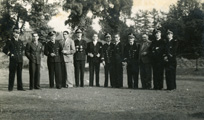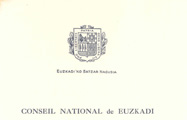- Chairman: Manuel de Irujo
- Deputy Chairman: Ram├│n Mar├Ła de Aldasoro (Delegate in Buenos Aires)
- Ordinary members: Isaac L├│pez de Mendizabal (Buenos Aires Delegation), Santiago de Cunchillos (Buenos Aires Delegation), Pablo de Artxanko (Buenos Aires Delegation), Juan de Olazabal (Delegate in Caracas), Francisco de Belaustegigoitia (Delegate in Mexico), Manuel de la Sota (Delegate in New York), Jos├® Ignacio de Lizaso (Delegate in London)
- Secretary: Angel Gondra (London Delegation)
ORIGINS AND CREATION OF THE NATIONAL COUNCIL OF EUZKADI
In May 1940, the Basque Government in exile had its headquarters in Paris. However, the German invasion of France brought major changes. The Basque president (or lehendakari) Jos├® Antonio Aguirre was trapped in Belgium and effectively disappeared from the scene until his escape to America over a year later. The other ministers of the Basque government had to go into hiding. Those who did eventually succeed in getting out of France followed Aguirre to the United States. The offices in Paris were occupied by the Germans and later handed over to the Franco government.
The German occupation severely disrupted the administrative machinery of the Basque government, with only its overseas delegations continuing to operate. Of these, only one left in Europe was the London office, headed by Jos├® Ignacio de Lizaso. On the other side of the Atlantic, there were delegations in New York, Buenos Aires, Mexico and Caracas as well as a newly formed office in Santo Domingo.
Manuel de Irujo, former PNV member of parliament, chairman of the Basque parliamentary party and minister under the republican government had also been resident in London since 1939. A number of other PNV leaders who had managed to flee France, including Luis Arredondo, El├Łas Etxebarria and Antonio Gamarra were also based in England, where they set up the party executive body, the Euzkadi Buru Batzar. Also in the country were Pedro Ormaetxea, of Basque Workers Solidarity; various members of the Basque Intelligence Service; a large group of merchant seamen who had chosen not to return at the end of the Civil War, as well as a small Basque colony formed mainly of children, evacuated to Southampton in 1937 on board the transatlantic liner "Havana".
The members of the EBB in England, together with Irujo and the London delegate, Lizaso, decided to create an interim body to fill the gap created by the absence of the lehendakari and his ministers and take on the work of government. It was finally constituted on 11 July, 1940 under the name of "National Council of Euzkadi (Consejo Nacional de Euzkadi-Euzkadi'ko Batzar Nagusia)". It was comprised as follows:
The ministers were not assigned specific portfolios. The three members resident in London ŌĆōIrujo, Lizaso and GondraŌĆō formed a standing committee which in practice would be responsible for the bulk of the Council's decisions and actions. The Council was to have its headquarters in London. The National Council remained in existence until 28 January, 1942, when President Aguirre arrived in the United States and resumed his role as the maximum representative of Basques around the world.

THE AGREEMENT WITH FREE FRANCE
The National Council issued an official notification of its foundation and entered relations with the British foreign office, the governments in exile of Czechoslovakia, Poland, the Netherlands, Yugoslavia, Belgium and Norway, the French Empire Defence Council (Free France) and accredited embassies in London, particularly the embassies of the United States and several Latin American countries. However, the direct contacts with the British Government did not yield the results the National Council had hoped for. The progress of the war had forced the British to pursue a policy of appeasement towards Franco. Britain wanted at all costs to prevent Franco from entering the war and attacking the strategic base at Gibraltar.
The British themselves advised Lizaso that the Basques should enter relations with Free France, as a neighbouring country. The French soon showed their interested in such a move. Talks on a collaboration agreement began on 15 November, when the National Council of Euzkadi submitted a preliminary draft for a Franco-Basque pact to the French Empire Defence Council. After six months of negotiations, the text of the agreement was finally decided upon. The three most significant aspects were: incorporation of Basque volunteers into a unit of the Free French Forces; economic and commercial co-operation and collaboration between Basque and French intelligence services.
The document was signed at the headquarters of the Free French Forces at No. 4, Carlton Gardens on Saturday 17 May, 1941, at 4.30 pm. The French were represented by Ren├® Cassin, Maurice Dejean, Major Escarr├Ī and Elene de la Souch├©re and the Basque Council by Jose Ignacio de Lizaso and Angel Gondra. The agreement was signed by Cassin and Lizaso. Copies were made in French, Spanish and Basque. In itself, the pact was of great historical importance; for the first time, a French authority recognised the public legal status of a body representing the Basque people. It was also the first international agreement to be signed in Basque. Interestingly, both of the signatories were Basque, since Ren├® Cassin ŌĆōlater to win the Nobel Peace PrizeŌĆō was a native of Bayonne.
The agreement was ratified in an exchange of telegrams between the presidents of the two councils. On 26 May, Irujo sent a telegram to De Gaulle, then in Cairo. On 30 May, De Gaulle answered him in another telegram, in which he stated that "the collaboration between our two peoples is an important element in the fight against our common enemy and for the triumph of national freedoms around the world". Simultaneously, on 27 and 28 May, the Foreign Office and the American Embassy were informed of the execution of the agreement and its contents.
.jpg)
DIFFICULTIES IN APPLICATION
From the outset, the British Government had misgivings about the pact. After learning of the agreement, senior civil-servants from the Foreign Office met with Escarr├Ī on 7 June. Two days later, Escarr├Ī wrote to Lizaso, reporting that: "The British government considers it indispensable, on the one hand for the agreement to be kept entirely secret and on the other, for its implementation to be suspended until further orders (...). This desire on the part of the British government is a new development and we have no choice but to comply. Needless to say, this deferral of enactment in no way devalues an agreement that has been fully executed".
Although the British position left little possibility for application of the agreement, some elements were discreetly enacted. The area that was developed to the greatest extent was the incorporation of Basque volunteers into the ranks of the Free French Forces. In June 1941, the first steps were taken to create a Basque military unit. This led to the creation on 11 September of the Third Battalion of Naval Fusiliers of the Free French Naval Forces. However, the project was ultimately prevented from going ahead by British intervention. The English did not oppose Basques joining the Free French Forces, but they did object to them organising their own units and the battalion was finally disbanded on 23 May, 1942.
The other two areas of the agreement were developed to a much lesser extent, largely remaining confined to the realms of theory. Committees were formed, meetings were held, some studies were carried out and some appointments were even made, but with no tangible results. Perhaps the only practical expression of these contacts was the sending of a "commercial" mission to French Equatorial Africa. The delegation was made up of two officers from the Battalion of Naval Fusiliers and its real purpose was to monitor secret German activities on the River Muni, to perform intelligence work and to prepare an operation to be carried out in the event of Spain's entering the war. But this mission was also frustrated when the Battalion was disbanded and the two officers were obliged to return.
In the favourable climate created between French and Basques by the signing of the agreement, attempts were also made to widen cultural relations. After a number of contacts with various French ministers and with De Gaulle himself, on 10th September 1942, a "Cultural Union of the Countries of Western Europe" was founded, based around the French Institute of London. The Basque group was formed on 25 October under the statutes of the union; a Catalan group was also formed. The Cultural Union organised lectures, competitions and exhibitions but, once again British intervention, invoking higher interests, put an end to the initiative in 1943.
After President AguirreŌĆÖs arrival in the US and subsequent resumption of the leadership of the Basque Government, he expressed an interest in the pactŌĆÖs being ratified with his own participation. On 28 January, 1942, Lizaso wrote to De Gaulle, proposing an exchange of letters between the two presidents. Although De Gaulle did not raise any opposition, the plan was ultimately unsuccessful. The liberation of France and the transfer of the French Government to Paris substantially altered the situation. The British government notified both the French government and the Basque delegation that as far as it was concerned, both the suspension of implementation and the secrecy of the Franco-Basque agreement were lifted. However the Pact no longer had any practical application, although it did serve as a reference for the creation of a new military unit, the Gernika Battalion, which fought against the Germans at Point de Grave in 1945.

